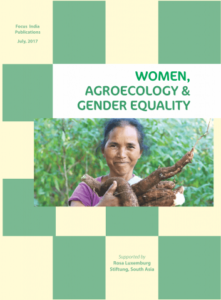
This booklet is intended to serve as a basic background resource for grassroots groups, to make links between gender and agroecology, and to understand agroecology’s potential to address gender inequalities.
Agroecology is fast growing as a social movement around the world today. It is showing real potential in solving the multiple crises that our planet and humanity face–hunger, climate change, water scarcity, environmental contamination and unemployment. It is a true grassroots solution, accessible and affordable for the majority of the world’s resource-poor rural communities. But, can it also make sure that both men and women benefit equally? Does it have the potential to challenge gender-based inequalities in societies? Can it ensure that women become decision makers at home and leaders in society just like men? If so, how? What would such agroecology projects look like?
We start with some very basic concepts about gender, patriarchy, gender roles, and how all these relate to agriculture. We then look at how capitalist developments in agriculture have intensified gender inequalities and marginalized women. Following this, we look at the current status of women in agriculture in India, including at their rights and entitlements as enshrined in the constitution of India. We then look at agroecology–its contested definitions today, and under what conditions it creates gender equality and when it does not. We look at its impacts at the household level and how it can create more opportunities for women at the community level.
Finally, we provide some success stories from India, where agroecology has proven to be a crucial vehicle for gender equality. The cases of Tamil Nadu Women’s Collective, Kudumbashree, and Deccan Development Society show us examples of the most oppressed women—mainly women from particular castes and landless communities, shifting towards collective farming—are gaining access to land, learning agroecology, acquiring food autonomy, and turning into independent, bold, leaders and farmers of today. These experiences have also changed their position in the household. The case of the Manipur’s Rural Women’s Upliftment Society shows us that even in societies living under military occupation and violence, agroecology can provide spaces for women to work in solidarity and gain livelihoods, income and support. Such experiences also give women the confidence to do more political work and challenge unjust laws, including customary laws in their communities that they find to be discriminatory towards women.





